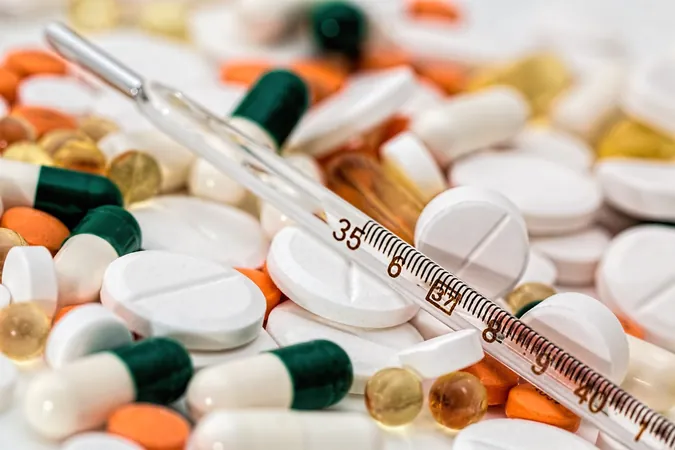
Warning: Common Gut Bacteria May Sabotage Your Medications, New Study Reveals!
2025-04-03
Author: John Tan
Groundbreaking Discovery
A groundbreaking study published in *Nature Chemistry* by scientists from the University of Pittsburgh and Yale University has unveiled a startling discovery: common gut bacteria may metabolize certain oral medications, specifically those targeting G protein-coupled receptors (GPCRs), thus potentially diminishing their effectiveness.
Importance of GPCRs
GPCRs are critical cellular receptors that are the targets of over 400 medications approved by the U.S. Food and Drug Administration (FDA). These drugs are commonly prescribed for a variety of health conditions, including migraines, depression, type 2 diabetes, and even prostate cancer.
Quote from Dr. Qihao Wu
"Grasping how GPCR-targeted drugs interact with the intricate web of human gut microbiota is essential for the advancement of personalized medicine," states Dr. Qihao Wu, the study's lead author and assistant professor at the Pitt School of Pharmacy. Wu began this significant research during his postdoctoral work at Yale, emphasizing the importance of this study in shaping future drug design and therapeutic strategies to enhance treatment efficacy and safety for individuals.
Variability in Drug Effectiveness
The variability in drug effectiveness has long been attributed to numerous factors, such as age, genetic differences, and dietary habits. However, the influence of gut microbes, which can metabolize drugs into varying chemical forms, is a newly emerging factor that could inform personalized medication strategies.
Innovative Laboratory Pipeline
To explore this complex interaction, Dr. Wu and his Yale colleagues, including noted scientists Jason Crawford, Noah Palm, and Andrew Goodman, established an innovative laboratory pipeline to test which gut bacteria affect drug metabolism. They created a synthetic microbial community using 30 common bacterial strains found in the human gut and subsequently introduced 127 GPCR-targeting drugs to this environment.
Significant Findings
Their results were revealing: the microbial community metabolized 30 out of the 127 tested drugs, with 12 undergoing significant transformations that greatly reduced the concentrations of the original medications.
Case Study: Iloperidone
One noteworthy focus of their investigation was iloperidone, a drug frequently used to treat schizophrenia and bipolar disorder. Remarkably, the bacterial strain Morganella morganii was identified as a significant player in inactivating iloperidone by converting it into various different compounds, a process validated both in laboratory settings and in mouse models.
Concerns Raised
These findings raise a critical concern: specific gut bacteria could potentially render GPCR-targeting drugs less effective by altering them before they can perform their intended function. Nevertheless, Dr. Wu stresses the necessity for further research to understand the full implications of these interactions in human health, cautioning patients against altering or discontinuing their medications without first consulting healthcare providers.
Broader Applications
Interestingly, while the study primarily concentrated on GPCR drugs, the methodologies developed could be expanded to examine interactions involving any orally administered substances. Dr. Wu hints at broader applications of their pipeline, including investigating how gut bacteria interact with dietary compounds. For instance, the team detected several phytochemicals present in corn that might influence gut barrier function and noted that the microbiome could act protectively by detoxifying these substances.
Conclusion
As research continues, this study highlights a significant step toward understanding the intricate relationship between our gut microbiota and the efficacy of medications, paving the way for future advancements in personalized medicine. Could your gut bacteria be affecting your health more than you think? Stay tuned for more updates on this crucial topic!






 Brasil (PT)
Brasil (PT)
 Canada (EN)
Canada (EN)
 Chile (ES)
Chile (ES)
 Česko (CS)
Česko (CS)
 대한민국 (KO)
대한민국 (KO)
 España (ES)
España (ES)
 France (FR)
France (FR)
 Hong Kong (EN)
Hong Kong (EN)
 Italia (IT)
Italia (IT)
 日本 (JA)
日本 (JA)
 Magyarország (HU)
Magyarország (HU)
 Norge (NO)
Norge (NO)
 Polska (PL)
Polska (PL)
 Schweiz (DE)
Schweiz (DE)
 Singapore (EN)
Singapore (EN)
 Sverige (SV)
Sverige (SV)
 Suomi (FI)
Suomi (FI)
 Türkiye (TR)
Türkiye (TR)
 الإمارات العربية المتحدة (AR)
الإمارات العربية المتحدة (AR)